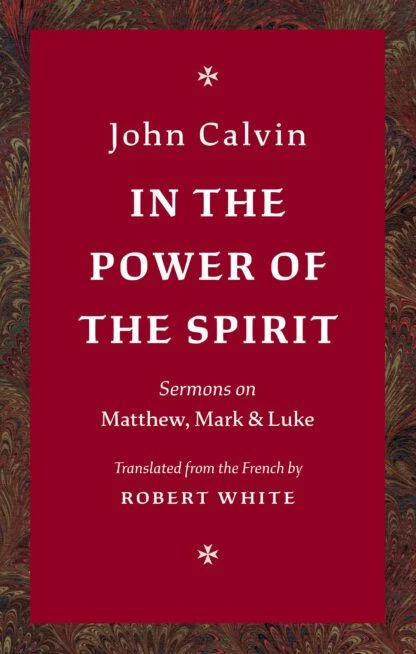
John Calvin
Reviewed by: Michael L. Babcock
In the Power of the Spirit: Sermons on Matthew, Mark, and Luke, by John Calvin, translated by Robert White. Banner of Truth, 2024. Hardcover, 320 pages. Reviewed by OP pastor Michael L. Babcock.
This book contains eighteen sermons by John Calvin from the Synoptic Gospels. In fact, these were the last sermons the Reformer preached from the New Testament and reflect a matured pastoral ministry. There is much to commend in this volume. First, Robert White’s translation from the French is to be praised. The modern English flows very well, making reading both easy and enjoyable. One could easily forget that these were preached over 460 years ago.
John Calvin is certainly well-known as a theologian, biblical commentator, and apologist. His academic works are invaluable in teaching and defending the historic Christian faith, but it is in his sermons where his pastoral skills are plainly and amply manifested. For that reason alone this book should be a part of everyone’s library. Above all else, Calvin wanted to be thought of as a pastor bringing God’s Word to God’s people in the local church. On every page of this volume, his ardor for the gospel shines forth. Moreover, you will not miss his love and concern for his congregation as he labored to bring Christ to them.
The devotional reading of this book will edify everyone. However, preachers in training will undoubtedly learn much from this collection. Of course, Calvin’s voice modulations or his gestures aren’t available to us, but these sermons show what good preaching looks like. Here is a good balance of biblical exposition, application, and warnings. He introduces the historical situations, explains how Christ is the center of the passage or event, relates the passage to the whole of Scripture, and then he aptly applies it all to the listeners’ own situation and historical context. Calvin is a master wordsmith, using idioms, strong words, and illustrations that don’t promote the preacher so much as to create an intellectual and emotional connection to the subject matter. Preaching is to be bold and sometimes like a needle prick, and Calvin demonstrated that several times in these sermons.
It should be remembered that Calvin always preached extemporaneously. Nevertheless, one definitely senses the careful study that went into his preaching. Moreover, he clearly meditated on the passage so that it deeply affected him before they were delivered. Perhaps he was not as redemptive-historical as we might like, but his plain and straightforward dealing of the text made the gospel both clear and understandable. On page 166 Calvin states, “Jesus Christ has made it clear that he is the church’s supreme teacher; on him the law and prophets all depended, and he is the goal to which all things tend.” That summarizes Calvin’s ambition in preaching these sermons, and I think he hits the mark.
Some might criticize the frequent assaults on the papacy and Roman rites. But Rome’s threat to historic Christianity prompted those outbreaks. Calvin’s rationale for them is found in his comment on 1 Thessalonians 5:20: “Let us understand prophesying to mean the interpretation of Scripture applied to the present need.” The OPC’s Directory for Worship II.A.3.b reminds preachers that they are “God-appointed watchmen on Zion’s walls,” whose task is also “to warn the congregation of prevalent soul-destroying teaching by enemies of the gospel.” Calvin took his role seriously.
I disagreed with an exegetical point made in a few sermons where Calvin taught that John’s baptism was the same as Christian baptism. Differences aside, I found his application useful. Indeed, preachers may miss a point, but if Christ is at the center of the sermon, and if true preaching communicates God’s grace, we will always encounter Christ despite the preacher’s weakness. With that, this book is a gem and will not disappoint to reveal Christ’s glory.
December 28, 2025
December 21, 2025
December 14, 2025
December 07, 2025
November 30, 2025
November 23, 2025
November 16, 2025
© 2026 The Orthodox Presbyterian Church